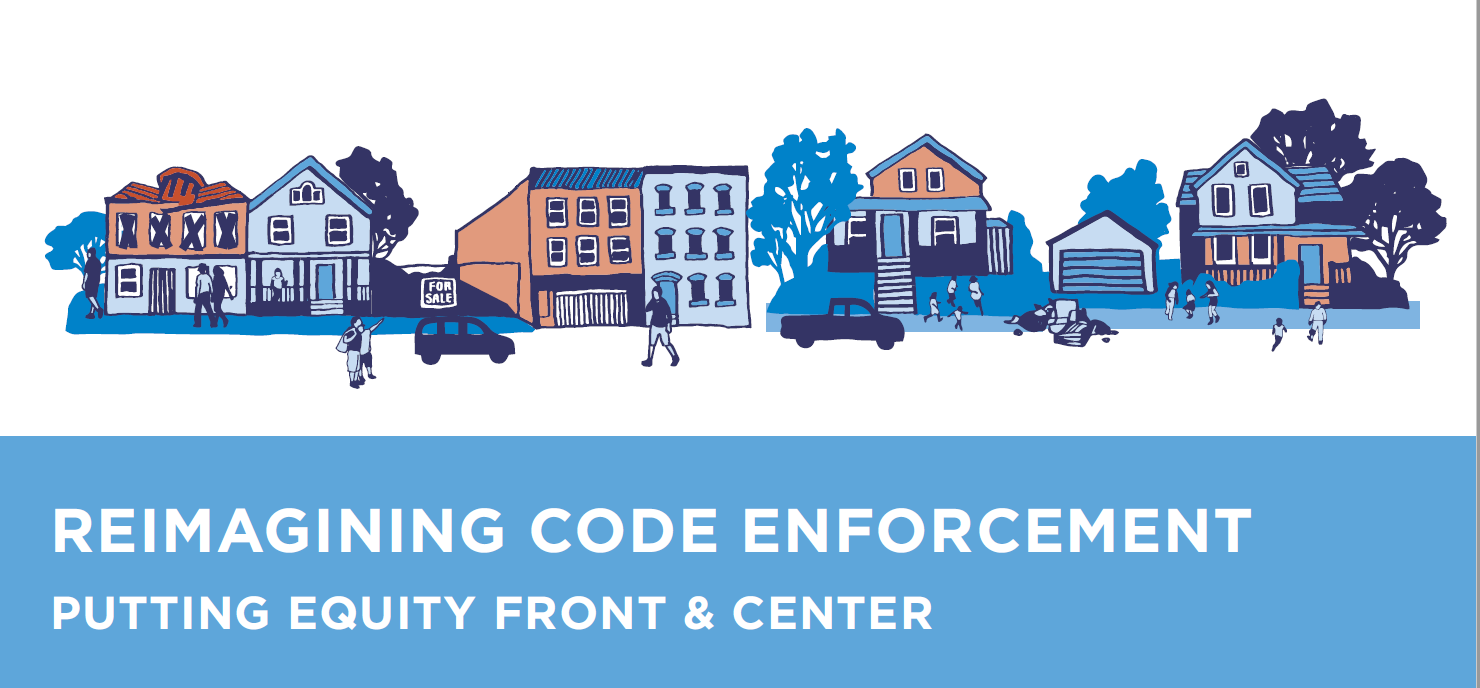Why should we focus on equity code enforcement when talking about safe and healthy neighborhoods?
Code enforcement has a clear and specific mission: keeping homes and neighborhood residents safe and healthy by encouraging the repair or rehabilitation of distressed properties, ensuring that vacant lots are clean, holding landlords accountable, and protecting low-income tenants and homeowners. Since it touches so many facets of the built environment, code enforcement has the potential to preserve neighborhoods and increase resiliency.
However, the reality is that code enforcement actions impact low-income communities of color disproportionately and harm those who need it most if implemented poorly.
Fear of eviction and immigration detention prevents vulnerable renters living in unsafe conditions from contacting city enforcement about negligent landlords. Elderly homeowners with fixed income get code violations without resources ever to address the cost of bringing their homes into compliance.
The list goes on, and the range of issues is extensive. Here are some additional points:
• Due to the history of redlining and disinvestment in communities of color, priority areas for enforcement are often low-income communities of color
• Research has shown that people of color receive more minor violations In gentrifying neighborhoods
• There is a chronic lack of comprehensive social support for residents displaced In condemnation
• Housing voucher recipients are often placed in low-quality housing
• Low-income homeowners may not have the resources to address code violations
• Some problem landlords may prefer to pay a fine than address violations.
This disproportionate impact is not random or new.
Black and brown neighborhoods have suffered historic disinvestment and redlining, which, paired with less access to credit, lower appraisal rates, lower homeownership rates, and a higher rate of code violations, make their communities more vulnerable. The 2008 foreclosure crisis plus the housing instability caused by the economic impact of the COVID-19 pandemic have exacerbated these impacts. Furthermore, the code enforcement process can reflect and reproduce implicit biases, viewpoints, and limitations given our context of institutional and systemic racism.
Is there hope?
Of course, there is! To make code enforcement more equitable, the process must be restorative, evidence-based, collaborative, community-centric, and proactive. The first step is working with others within and outside of the city government. Code enforcement alone cannot deal with the significant equity issues affecting our neighborhoods. It is essential to build or deepen partnerships with city and county agencies (city planning, community development, social services, health, public housing authority) and non-government entities (community organizations, service providers, utility companies).
Where do we begin?
• Establish official channels for data sharing.
• Identify persistent problems touched by different agencies and other non-government entities.
• Instead of dealing with cases on a case-by-case basis, brainstorm and operationalize joint solutions with community organizations and service providers to institutionalize collaboration that can withstand leadership changes
Hester Street recently presented this and more findings and compelling examples from our partner cities during a webinar with our allies: Strategic Code Enforcement Management Academy, Memphis’s Neighborhood Preservation Inc., and the Urban Institute. Forty-three cities across the country were part of the event. It drew from Hester Street’s work across ten municipalities across NY State through the Cities RISE program.
Want to know more? Please read our presentation here.
On June 24 – 25, 2021, Hester Street’s Nisha Baliga and Jimena Veloz will serve as Faculty for SCEMA, providing interactive workshops and tools to integrate an equitable approach to code enforcement. Find more registration info here.
* Founded in 2017, SCEMA is a joint program of the University of Memphis School of Law and Neighborhood Preservation, Inc., devoted to elevating the field of code enforcement and building a network of showcase communities. SCEMA provides an opportunity for peer learning among code enforcement programs from diverse cities, counties, and towns that want to enhance, expand or share their transformations to strategic code enforcement.


